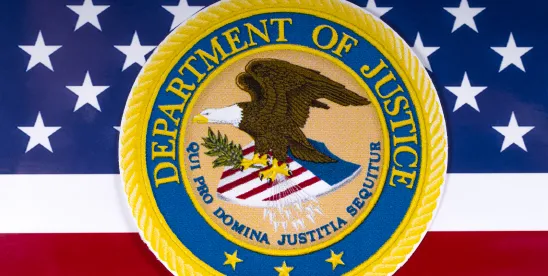Varnum Viewpoints:
More Certainty for Companies: The DOJ now offers a clearer path to declination for companies that self-disclose, cooperate, and remediate.
Expanded Benefits Even with Aggravating Factors: Companies with aggravating factors may still, qualify for declination or “near miss” treatment.
Whistleblower Risk Heightened: With expanded DOJ whistleblower programs, timely self-reporting is more critical than ever.
The head of the United States Department of Justice Criminal Division, Matthew R. Galeotti, announced on May 12, 2025, that the division is “turning a new page” on white collar crime enforcement. Among other changes, the Criminal Division has revised its corporate enforcement policy to increase incentives for companies to self-disclose misconduct, offering a “clear path” to avoid prosecution.
Speaking at the Securities Industry and Financial Markets Association’s (SIFMA) Anti-Money Laundering and Financial Crimes Conference, Galeotti explained the division will focus on the most egregious and urgent prosecutions, allowing the DOJ to avoid burdensome and drawn-out corporate enforcement investigations. For American companies, voluntary self-disclosure (VSD) is now more definitively advantageous than it was under the previous policy.
What is New About the Revised Corporate Enforcement Policy?
The revised Criminal Division Corporate Enforcement and Voluntary Self-Disclosure Policy (CEP) states the division will decline to prosecute a corporation for criminal conduct when the company makes a proper VSD, fully cooperates with the investigation, timely and appropriately remediates, and does not have aggravating circumstances. The CEP “encourages voluntary self-disclosure of potential wrongdoing at the earliest possible time, even when a company has not yet completed an internal investigation[.]”
Under the previous CEP, these criteria led only to a presumption of declination, leaving companies to consider the possibility that early VSD could do them more harm than good. The goal of the revised policy is to provide more certainty for companies.
Companies that do not meet the criteria for declination can still benefit from the revised policy. For example, the CEP provides prosecutors discretion to recommend declination, even if there are aggravating circumstances, after weighing the severity of those circumstances against the company’s cooperation and remediation. The Criminal Division will make all declinations under the CEP public, likely to remove the company from the cloud of investigation and in service of general transparency.
In addition, if a company timely and appropriately remediates and self-reports in good faith but does not meet the VSD requirements or has aggravating circumstances that warrant a criminal prosecution, the company will receive “near miss” treatment. “Near miss” treatment yields a non-prosecution agreement (NPA) with a term of three or fewer years, no monitor requirement, and a 75 percent reduction of an already lower fine. The previous policy allowed prosecutors to recommend a fine reduction between 50 and 75 percent off the low-end of the guidelines range.
Companies who are not a “near miss” can still benefit from remediating and cooperating under the revised policy. A company who appropriately remediates and cooperates will receive a presumption of a fine on the low end of the United States Sentencing Guidelines range. The company will not be eligible for more than a 50 percent fine reduction, but prosecutors retain discretion to determine the appropriate form of resolution (e.g., a non-prosecution agreement, deferred prosecution agreement, or guilty plea).
The Criminal Division published a flowchart and definitions to provide guidance on what companies can expect in various circumstances.
Key Considerations for Corporate Compliance and Enforcement
The takeaway for companies is that self-reporting, cooperation, and remediation should provide significantly greater and more predictable (though not certain) benefits than they have previously. The DOJ appears willing to work with companies who come forward in good faith, even if they do not meet all VSD requirements.
The CEP does not specifically define aggravating circumstances. However, it suggests the division will consider the nature and seriousness of the offense, the egregiousness or pervasiveness of the misconduct within the company, the severity of harm caused by the misconduct, and whether the company has been subject to criminal adjudication or resolution for similar conduct within the preceding five years. Companies could benefit from robust internal compliance programs, as prompt discovery and remediation of misconduct and good-faith disclosure to the DOJ appear to be increasingly valuable. In another speech on June 10, Galeotti emphasized that, although it retains discretion to decide declination is not appropriate in certain cases, the Criminal Division is not playing “a game of ‘gotcha’.” Galeotti assured his audience that he is reviewing all corporate resolutions to ensure that a non-declination resolution is warranted by circumstances that are “truly aggravating and sufficient to outweigh the fact that the company voluntarily came forward.”
Galeotti’s remarks and his memorandum reflect a continued focus on prosecuting individual actors, most prominently spelled out by Deputy Attorney General Sally Yates in 2015. Galeotti told SIFMA that the DOJ is “here to prosecute criminals, not law-abiding companies,” and urged companies to use their compliance programs as “the first line of defense” against criminal conduct, incentivizing them to help the DOJ identify and prosecute culpable individuals. In discussing the DOJ’s new guidelines on enforcement of the Foreign Corrupt Practices Act, Galeotti observed in his June 10 remarks that they reflect “common sense principles, such as focusing on specific misconduct of individuals, rather than collective knowledge theories.”
Galeotti’s May 12 speech highlighted the benefits of early cooperation, but his June 10 remarks pointed to the “important corollary”: the Criminal Divisions will “swiftly” and “aggressively” prosecute individuals and companies who do not come forward “and all the benefits of our policies will not be available to these offenders.” Galeotti reported that the DOJ has seen new voluntary self-disclosures since the revised CEP policy was issued.
Companies should also be aware that the Criminal Division piloted a VSD program for individuals in April 2024 and has expanded its whistleblower award program, incentivizing individuals to help the DOJ discover corporate misconduct. Under the CEP’s definition of voluntary self-disclosure, a company can still qualify for a presumption (notably, not a certainty) of declination if a whistleblower makes both an internal report to the company and the DOJ and the company self-reports within 120 days of receiving the internal report. The interplay between the revised CEP and the pilot VSD and whistleblower award programs will likely increase the number of disclosures from both individuals and companies, as everyone involved will be aware of the incentives on both sides. This may make disclosure even more attractive to companies, who should consider getting to the DOJ’s door before a whistleblower does.
However, companies and counsel should keep in mind that these policies govern the DOJ Criminal Division only. They do not bind the 93 U.S. Attorneys’ Offices, the other litigating components at DOJ (such as the Civil, Antitrust, Environment and Natural Resources, and National Security Divisions), other federal agencies (such as the Securities and Exchange Commission), or state and local authorities. These policies might have persuasive weight in how U.S. Attorneys, other DOJ components, and other agencies approach white collar and corporate enforcement, but it is important to consider any multi-jurisdictional aspects at play.
2025 summer associate Julia Sommerfeld contributed to this advisory. Julia is currently a student in the Moritz College of Law at Ohio State University.





 />i
/>i

